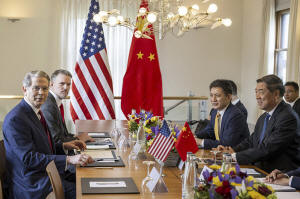China blasts new US rule banning use of Huawei's Ascend advanced
computer chips
[May 16, 2025] By
ELAINE KURTENBACH
China has blasted a new U.S. rule against use of Ascend computer chips
made by Huawei Technologies anywhere in the world, chafing Thursday
against the limitations of a temporary truce in the trade war between
the two biggest economies.
Beijing moved ahead, however, with fulfilling its promise to lift
retaliatory measures it imposed after U.S. President Donald Trump
escalated his trade war, raising tariffs on Chinese products to as high
as 145%. One key action was to remove a ban on exports to the United
States of minerals known as rare earths that are used in many high-tech
products.
Despite the deal struck last weekend in Geneva, frictions remain.
Earlier this week, the U.S. Commerce Department's Bureau of Industry and
Security issued guidance saying that Huawei's Ascend semiconductors are
subject to U.S. export controls, on the basis that they are thought to
employ U.S. technology.
“These chips were likely developed or produced in violation of U.S.
export controls,” it said in a statement on its website, adding that
“the use of such PRC advanced computing ICs risks violating U.S. export
controls and may subject companies to BIS enforcement action.”

China's Commerce Ministry responded that the move was "not conducive to
long-term, mutually beneficial, and sustainable cooperation and
development between the two countries. The Chinese side urges the U.S.
side to immediately correct its erroneous practices,” said ministry
spokesperson He Yongqian.
Huawei's Ascend chip is central to China's effort to build its own
capacity to build leading edge computer chips and other technologies.
Analysts say use of the chip in China's DeepSeek artificial intelligence
effort reflects a potential challenge for Nvidia in the global AI
market.
[to top of second column] |

U.S. Secretary of the Treasury Scott Bessent, left, U.S. Trade
Representative Jamieson Greer, second left, Chinese ambassador to
the World Trade Organization Li Chenggang, second right, and Chinese
Vice Premier He Lifeng, right, attend a bilateral meeting between
the United States and China, in Geneva, Switzerland, on Saturday,
May 10, 2025. (Martial Trezzini/Keystone via AP)
 He also lashed out against U.S.
tariffs on imports of Chinese steel and aluminum, which have not
gotten a reprieve after Beijing and Washington agreed to their pause
in many tariff increases.
She said the U.S. should give up its use of Section 232 of the Trade
Expansion Act of 1962, which gives the president power to impose
tariffs on other countries on national security grounds.
In February, Trump drew on that authority to restore 25% tariffs on
steel and aluminum that he had imposed during his first term in
office.
Speaking at a weekly ministry briefing, He urged the US to end the
higher tariffs “as soon as possible."
The 30% levy that America is now imposing on Chinese goods includes
an existing 20% tariff intended to pressure China into doing more to
prevent the the synthetic opioid fentanyl from entering the United
States. It also includes the same 10% “baseline’’ tariff Trump has
slapped on imports from most of the world’s countries. The 30% tax
comes on top of other levies on China, including some left over from
Trump’s first term and kept by former President Joe Biden.
China is imposing a 10% tariff on U.S. products during the 90-day
negotiating period.
All contents © copyright 2025 Associated Press. All rights reserved |